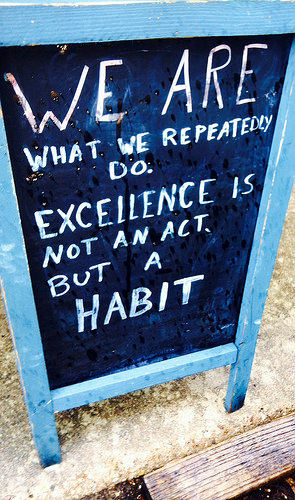
“You want to be seen? Dude! You can’t hide!” When someone is being his authentic, unaffected self, he will show you his DISC type by showing you his empathy strategy by showing you his social praxis by showing you his habits-of-mind by showing you his priorities.Translation: “We are what we habitually do.”Photo by: lee leblanc
At the start of the session, they handed out a little questionnaire, a DISC quiz. I read all of the questions in a quick scan, then drew a single straight line through all of the D answers.
Just that much was a huge eye-opener for me, to discover I am and always have been Driven with a singularly perfect Driven display: Maximal results, minimal effort.
That’s where I started to play. My theoretical grounding in old-school DISC was that class, but I was working with it as practical ontology, not something to be read about. I ignored all the nomenclature and the supposed distinguishing categories and simply focused on the correspondence of the model to reality.
Translation: I liked the predictive accuracy, but I didn’t trust any part of the validation. I glossed DISC without naming it in Chapter 10 of Man Alive, but I didn’t defend it until I could demonstrate it as ontology, in Nine empathies.
That much is cool, but it’s only necessary in order to establish the underlying causality of DISC-mediated behavior.
So we can talk about reptilian versus mammalian empathy strategies.
Or we can explore unilateral versus reciprocal social strategies.
Or we can simply focus on priorities, since this is what DISC is, at bottom: Your unique rank-ordering of life’s priorities.
Do you want the job done? Do you want be acknowledged for your efforts? Do you want to have fun with the other people doing it? Or do you want for it to be perfectly correspondent to the procedural plans and financial projections?
When you’re on the bubble – when you have to choose, when you can only have one of those four outcomes – which matters to you most?
In Shyly’s delight, I gave the four DISC drives ‘A’ names: Accomplishment, Appreciation, Affection and Accountability. Those correspond to the Driven, Incandescent, Sociable and Cautious temperaments, so knowing which of the four outcomes matters to you more, you now know your dominant personality type.
As discussed above and abundantly, I’m a big old D, an off-the-charts D. Whatever you are, assume you got the outcome you wanted and then figure what matters to you next on the list.
So when my need to have accomplished my objective is satisfied, what do I want more of the three remaining options – in my case Appreciation, Affection or Accountability. I choose ballyhoo, of course. You’re soaking in it. I am a Di, and a Di will never tire of telling you all about the experience of being a Di.
But that second choice is the secret to the sub-dominant characteristic. Your preferences for your third and fourth choices will fill out your whole DISC profile, but the latter two are generally of much smaller significance than the first two.
Translation: It’s useful to know why Dsci is a better profile, for a father, than Dsic, but for day-to-day interactions with people outside your home, knowing the dominant and sub-dominant characteristics is usually sufficient.
So if you take the time to work out what someone wants – as reflected in what he is doing – you can suss out his DISC profile without worrying about the etiology of that behavior.
High stress or low commitment can mislead, but when someone is being his authentic, unaffected self, he will show you his DISC type by showing you his empathy strategy by showing you his social praxis by showing you his habits-of-mind by showing you his priorities.
All of those will be discernible and aligned in parallel, so any one is a reliable proxy signal for the others.
Translation: “We are what we habitually do.” To understand another man’s priorities is to have abstracted his DISC profile.
Now that you know that this can be done – and now that I’ve shown you a wicked easy way to do it – when do you plan to get started?















